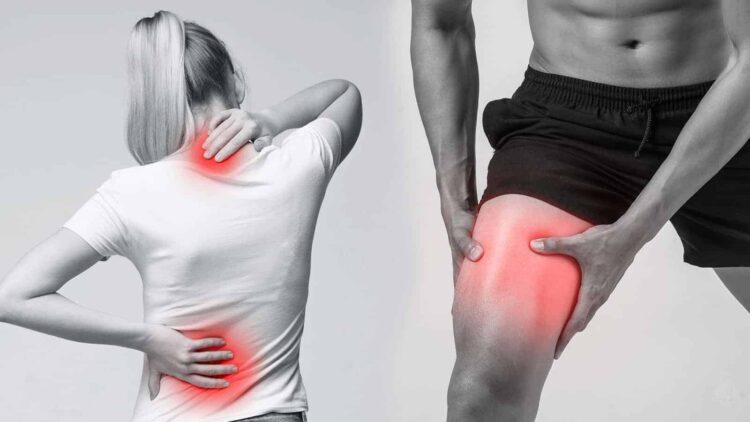Muscle pain and cramps can be incredibly debilitating, affecting our daily lives and preventing us from performing at our best. If you’re someone who has experienced the discomfort of muscle pain or cramps, you may have heard about the potential benefits of magnesium.
But what exactly is magnesium and how can it help relieve muscle pain and cramps?
Magnesium is an essential mineral that plays a crucial role in regulating the body’s functioning. It is involved in over 300 biochemical processes, including muscle contraction and nerve transmission.
While studies have explored the relationship between magnesium and muscle cramps, the effectiveness of magnesium supplements in relieving cramps is still inconclusive.
Despite the ongoing debate, there are potential benefits of magnesium for managing muscle pain and cramps. Magnesium is believed to regulate muscle contractions, nerve conduction, and glucose availability during exercise, which can contribute to improved muscle performance.
In addition, magnesium supplementation has been associated with beneficial effects in conditions such as asthma, osteoporosis, migraine headaches, diabetes, heart disease, and depression. However, more research is needed to fully understand the extent of magnesium’s benefits for muscle pain and cramps.
Key Takeaways:
- Magnesium is a vital mineral involved in over 300 biochemical processes in the body.
- The effectiveness of magnesium supplements in relieving muscle cramps is still inconclusive.
- Magnesium may have potential benefits for managing muscle pain and improving muscle performance.
- Further research is needed to fully understand the extent of magnesium’s benefits.
- Magnesium supplementation has been associated with beneficial effects in various health conditions.
The Benefits of Magnesium for Muscle Pain and Cramps
Magnesium has been found to have potential benefits in managing muscle pain and cramps. It plays a crucial role in regulating muscle contractions, nerve conduction, and glucose availability during exercise, all of which contribute to improved muscle performance.
By ensuring proper muscle function, magnesium can help alleviate muscle pain and reduce the frequency and severity of cramps.
In addition to its impact on muscle health, magnesium supplementation has been associated with a range of other beneficial effects. Research suggests that sufficient magnesium levels may help in conditions such as asthma, osteoporosis, migraine headaches, diabetes, heart disease, and depression.
While more research is needed to fully understand the extent of magnesium’s benefits for muscle pain and cramps, the existing evidence points to its potential as a natural remedy.
“Magnesium plays a crucial role in regulating muscle contractions, nerve conduction, and glucose availability during exercise.”
One of the key mechanisms through which magnesium helps with cramps is its ability to relax muscles and counteract calcium’s role in muscle contraction. Calcium promotes muscle contraction, while magnesium helps muscles relax.
By maintaining an adequate amount of magnesium in the body, muscle cramps can be prevented or mitigated.

Magnesium Sources and Recommended Intake
Increasing magnesium intake can be achieved through both dietary sources and supplements. Magnesium is a mineral that plays a crucial role in various physiological processes, including muscle function and relaxation. For individuals experiencing muscle pain or cramps, ensuring an adequate intake of magnesium is important for overall muscle health.
Magnesium-Rich Foods:
One way to incorporate more magnesium into your diet is by consuming magnesium-rich foods. These include:
- Almonds
- Spinach
- Cashews
- Peanuts
- Soy milk
- Shredded wheat cereal
By including these foods in your meals and snacks, you can naturally boost your magnesium intake and support muscle health.
Recommended Intake:
The recommended daily intake of magnesium varies depending on age, gender, and life stage. The following are general guidelines:
| Group | Recommended Daily Intake |
|---|---|
| Men (19-30 years) | 400-420 milligrams |
| Women (19-30 years) | 310-320 milligrams |
| Pregnant Women | 350-360 milligrams |
These recommendations serve as a general guide, and individual needs may vary. It’s always best to consult with a healthcare professional to determine the appropriate magnesium intake for your specific circumstances.
Magnesium Supplements:
If you find it challenging to meet your magnesium needs through diet alone, magnesium supplements can be an option. They come in various forms, such as magnesium oxide, magnesium chloride, and magnesium citrate.
However, it’s crucial to consult with a healthcare professional before starting any supplementation regimen to ensure safety and efficacy.
Incorporating magnesium-rich foods into your diet and considering supplementation under professional guidance can help support your magnesium intake and promote overall muscle health.

The Effectiveness of Magnesium for Muscle Cramps
Clinical studies have examined the effectiveness of magnesium supplements in treating muscle cramps, particularly leg cramps. However, the evidence is limited and conflicting.
Some studies have reported no significant improvement in cramp frequency, severity, or duration with magnesium supplementation, while others have suggested a small positive effect, particularly in pregnant women.
Magnesium supplements for cramps are commonly used as a natural remedy for muscle pain, but it is important to note that the results may vary from person to person. While some individuals may experience relief from cramps with magnesium supplementation, others may not see any noticeable benefits.
It is worth exploring other natural remedies for muscle pain and cramps in addition to magnesium supplements. Stretching exercises, massage, and the application of heat or cold can all provide temporary relief.
Staying hydrated, avoiding alcohol, and maintaining a balanced diet rich in magnesium and other essential nutrients can also contribute to overall muscle health.
“While magnesium supplements may not be a definitive solution for muscle cramps, they are generally safe to use and may have other potential benefits beyond cramp relief.”
It is important to consult with a healthcare professional before starting any supplementation regimen and to rule out any underlying medical conditions that may be contributing to muscle cramps. They can provide personalized advice and recommend appropriate treatment options based on your individual needs.
Other Treatment and Prevention Tips for Muscle Cramps
While magnesium may not provide a definitive solution for muscle cramps, there are various other treatment and prevention strategies that can be helpful in relieving muscle pain and cramps. Here are some methods you can try:
- Stretching exercises: Performing stretching exercises, especially targeting the specific muscle group affected by cramps, has been found to be effective in alleviating muscle cramps.
- Massage: Gentle massage of the affected muscle can help relax the muscle and provide relief from cramps.
- Applying heat or cold: Applying either heat or cold to the cramp area can help relax the muscle and reduce pain. You can use a heating pad or a cold pack, depending on your preference.
- Staying hydrated: Dehydration can contribute to muscle cramps, so it is important to stay well-hydrated throughout the day. Drink an adequate amount of water and electrolyte-rich fluids.
- Avoiding alcohol consumption: Alcohol can dehydrate your body and increase the risk of muscle cramps. Limit or avoid alcohol consumption to prevent cramps.
- Using over-the-counter pain relievers or muscle relaxants: Over-the-counter pain relievers, such as ibuprofen or acetaminophen, can help provide temporary relief from muscle pain. Muscle relaxants may also be prescribed by a healthcare professional to alleviate severe cramps.
Remember, it is essential to consult with a healthcare professional for personalized advice and to rule out any underlying medical conditions that may be causing your muscle cramps. They can provide proper guidance on the most suitable treatment options for your specific situation.
Now, let’s take a closer look at the role of magnesium in relieving muscle pain and cramps in the next section.
Conclusion
While magnesium has long been touted as a natural remedy for cramps, particularly in the form of supplements, the scientific evidence supporting its effectiveness remains limited. While a deficiency in magnesium can contribute to muscle cramps, relying solely on supplementation may not be the most reliable solution.
However, incorporating magnesium-rich foods into your diet and maintaining a balanced intake of essential nutrients, including magnesium, can still provide overall health benefits.
It is important to note that there are various other treatment and prevention options available for muscle cramps. Stretching exercises targeted at the affected muscle group have been found to be effective in alleviating cramps.
Additionally, practices such as massage, applying heat or cold to the cramp, staying hydrated, and avoiding excessive alcohol consumption can also help provide relief. Over-the-counter pain relievers or muscle relaxants may be used as well, although consultation with a healthcare professional is advised.
While magnesium may not be the definitive solution for relieving muscle cramps, exploring different natural remedies and consulting with healthcare professionals can help you find personalized advice and tackle the issue effectively.
Remember, each individual’s needs and circumstances may vary, so it’s important to find the approach that works best for you.
FAQ
How does magnesium help with muscle pain and cramps?
Magnesium plays a crucial role in regulating muscle contractions and nerve transmission, which can help alleviate muscle pain and cramps. Additionally, magnesium supplementation has been associated with improved muscle performance and beneficial effects in various health conditions.
What are some food sources of magnesium and the recommended daily intake?
Magnesium-rich foods include almonds, spinach, cashews, peanuts, soy milk, and shredded wheat cereal. The recommended daily intake of magnesium is 400-420 milligrams for men, 310-320 milligrams for women, and slightly higher for pregnant women at 350-360 milligrams.
Are magnesium supplements effective for relieving muscle cramps?
The evidence regarding the effectiveness of magnesium supplements in treating muscle cramps is limited and conflicting. Some studies suggest a small positive effect, particularly in pregnant women, while others show no significant improvement. It is best to consult with a healthcare professional for personalized advice.
What are other treatment and prevention tips for muscle cramps?
Apart from magnesium supplementation, stretching exercises targeting the affected muscle group, massage, heat or cold application, staying hydrated, avoiding alcohol consumption, and using over-the-counter pain relievers or muscle relaxants can help alleviate and prevent muscle cramps.
Consulting with a healthcare professional is recommended.




